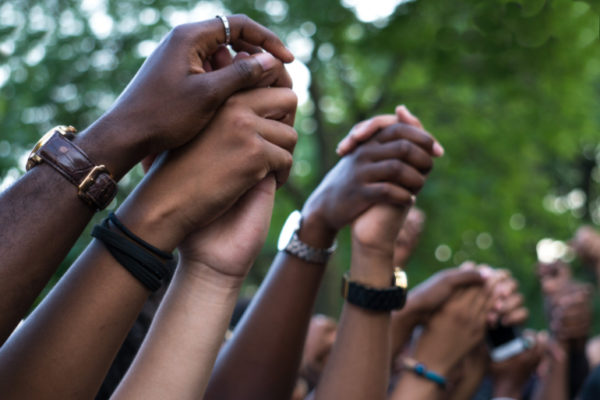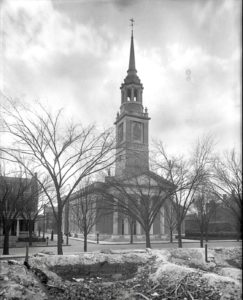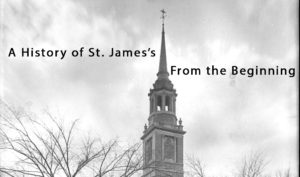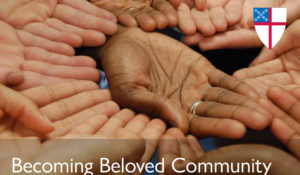Our Mission Statement
Following the commandment of Jesus Christ to love our neighbors as ourselves, and living into our Baptismal Covenant to respect the dignity of every human being, Becoming Beloved Community works to promote racial reconciliation, justice, healing, understanding, and forgiveness within our parish and the communities where we live and serve.
This initiative was formerly known as St. James’s “Racial Justice and Reconciliation” team. For more information about St. James’s Becoming Beloved Community ministry and work, please contact The Reverend Amelia Arthur, Senior Associate Rector for Adult Formation.
Sacred Ground – Registration Open
A curriculum designed by the Episcopal Church’s ministry for Becoming Beloved Community, Sacred Ground is a powerful ten-part film and readings-based dialogue series on race, grounded in faith. This series is especially designed to help white people talk about racism with other white people. You are invited to join one of our small, lay-facilitated groups, which meet once or twice a month–either Monday evenings or Thursday afternoons.
Each small group walks together through chapters of America’s history of race and racism, while weaving in threads of family story, economic class, and political and regional identity. Learn more at www.doers.org/becomingbelovedcommunity, www.episcopalchurch.org/sacredground, www.episcopalchurch.org/beloved-community.
Register for a Sacred Ground small group at https://forms.gle/FY1LmEDxqDffdBJn7 .
Contact: the Rev. Amelia Arthur, [email protected] or (804)355-1779, ext. 319

Words from Our Vestry and Clergy, and the Becoming Beloved Community Committee
We share words from our Vestry and Clergy in support of our ministry and peace in our community and world following the protests last summer. The members of our Becoming Beloved Community Committee continue to meet and work actively to bring justice and reconciliation at St. James’s and beyond.
See what we’ve uncovered about St. James’s
This project has four parts coinciding with the nation’s racial history. Part I, (link) Slavery through the Civil War, 1835-1865, and Part II, (link) Reconstruction and Post reconstruction, 1865 – 1900, were researched and written by the St. James History listed below. Part III, (link) Jim Crow to the beginning of the Civil Rights Movement, 1900 – 1960, was researched and written by a volunteer from St. Paul’s, Anne Hayes who was one of the researchers for St. Paul’s history. All the researchers and writers are volunteers, none are historians. Parts I, II, and III contain facts and information documented from books such as Not Hearers Only and Blind Spots as well as from Vestry minutes, Diocesan records, newspapers, the census and many other sources. Part IV, Civil Rights to the present, 1960 to 2022, will be completed in 2023.
Becoming Beloved Community Steering Committee
Maxie Cannon, Chair
Melinda Davis, Vestry
Andy Bennett, Vestry and BBC Formation Team Leader
Betsy Blair, BBC Community & Advocacy Team Leader
Blake Singer, BBC Community & Advocacy Team Staff
Nancy Warman, BBC Crisis Ministry Staff
The Rev. Amelia Arthur, BBC Formation Team Staff
Becoming Beloved Community History Team:
Andy Bennett
Jane Dowrick
Mary Lou Lee
Linda Owens
Alice Tousignant, Coordinator

Events
New Sacred Ground Classes
Watch this space for information about upcoming Sacred Ground classes in the Fall of 2021.
Please watch this video and hear directly from St. James’sers who have taken the course explain how powerful it was for them. For more information about the Sacred Ground series at St. James’s, contact The Reverend Hilary Streever.
Becoming Beloved Community
Becoming Beloved Community is the Episcopal Church’s long-term commitment to racial healing, reconciliation, and justice in our personal lives, our ministries, and our society. Click here to view the Becoming Beloved Community Vision Document and accompanying resources. This initiative invites all Episcopalians and members of faith communities to grow together as reconcilers, justice-makers, and healers in the name of Christ.
Sacred Ground – A Film-Based Dialogue Series on Race & Faith
Sacred Ground is a film- and readings-based dialogue series on race, grounded in faith. Small groups are invited to walk through chapters of America’s history of race and racism, while weaving in threads of family story, economic class, and political and regional identity. The 10-part series is built around a powerful online curriculum of documentary films and readings that focus on Indigenous, Black, Latino, and Asian/Pacific American histories as they intersect with European American histories. Click here for information, resources, and to be added to the mailing list to learn more.
 The History of St. James’s From the Beginning: Uncovering Our History
The History of St. James’s From the Beginning: Uncovering Our History
Wednesdays, April 14 – May 5, 2021
No matter how much you know about St. James’s, you’re about to learn a whole lot more. Every Wednesday evening from April 14 through May 5, we’ll see the history of St. James’s through the lens of race in our series: “Uncovering Our History.”
Under the leadership of the Racial Justice & Reconciliation Ministry, a team of St. James’s parishioners has undertaken the research. In addition, well-known historians of antebellum Richmond and the Episcopal Church, Dr. Gregg Kimball and Dr. Ed Bond, respectively, will provide us with the larger historical landscape and context.
Click here to register. After registering you will receive a confirmation email with a Zoom link. You will need to register each week.
Click here to see the full schedule.
Learn the History of St. James’s from the Beginning: Uncovering Our History – Wednesdays, April 14 – May 5, 2021
No matter how much you know about St. James’s, you’re about to learn a whole lot more. Every Wednesday evening from April 14 through May 5, we’ll see the history of St. James’s through the lens of race in our series: “Uncovering Our History.”
Under the leadership of the Racial Justice & Reconciliation Ministry, a team of St. James’s parishioners has undertaken the research. In addition, well-known historians of antebellum Richmond and the Episcopal Church, Dr. Greg Kimball and Dr. Ed Bond, respectively, will provide us with the larger historical landscape and context.
Click on the links below to see YouTube videos of each presentation in the series. New video recordings will be added each week.
Session One – April 14: An Overview of Richmond 1830-1865, was led by Dr. Gregg Kimball on April 14, 2021. Dr. Kimball is the Director of Public Services and Outreach at the Library of Virginia and the author of American City, Southern Place: A Cultural History of Antebellum Richmond. Click on the image below to view a recording of the presentation and discussion.
April 21: An Overview of the Episcopal Church 1830-1865, by Dr. Edward Bond Dr. Bond is recently retired from Editor-in-Chief of Anglican and Episcopal History at the Historical
Society of the Episcopal Church. He has taught the history of the Episcopal Church at Sewannee’s School
of Theology and was Associate Professor of History at Alabama A&M University 2003-2015.
Session Three – April 28: An Overview of St. James’s – Part I, was led by the St. James’s Racial Justice and Reconciliation History Team. The group presented the first half of their findings about St. James’s. The RJR History Team includes Alice Tousignant, Elizabeth Harvard, Jane Dowrick, Andy Bennett, and Mary Lou Lee.
Session Four – May 5: St. Philip’s 1830-1865, featured a presentation from Ken Anderson, a recent graduate of the University of Richmond Law School and parishioner at St. Philip’s Episcopal Church. He is researching St. Philip’s history as they approach their 160th anniversary later this year.
Make Me An Instrument of Peace: A Guide to Civil Discourse – Spring 2021
Created by the Episcopal Church, this powerful online course is facilitated at St. James’s by our own Rev. Hilary Streever. The Participant’s Guide will be emailed to all who register for our Wed. Night Fellowship series.
- While it’s best to complete the entire course, each part is discreet so you can join mid-course and still benefit from it.
- Fellowship is 6-6:30 pm. Discussion is 6:30 – 7:30 pm
- Please register for each session. Here’s the link to register.
Make Me an Instrument of Peace is ideal for anyone who wants to take dialogue between polarized people or parties seriously.
Historic East End Cemetery Clean Up – October 2020
This is a full day activity for all parishioners – youth, families and friends are asked to join in a day of cleaning debris and removing overgrowth gravestones and paths at this historic African American cemetery.
Richmond’s Unhealed History, Book Study – 2020
- Beginning July 21st on Zoom at 5:00 p.m. on Tuesdays through September
- Please sign up by emailing [email protected]
- The book is available from Richmond Hill Bookstore, Chop Suey Bookstore, and Fountain Bookstore. And, online as well.
Summer 2020 Classes
Recent protests and renewed conversation about racial justice and reconciliation have many people curious about these issues and the role of the Episcopal Church therein. You’re invited to join your clergy for a discussion of two resources this summer uncovering untold stories of Richmond’s history and the Episcopal Church’s history with race, power, and division.
- Tuesday, August 11 at 12:30 p.m.: “The Church Awakens: African Americans and the Struggle for Justice,” online exhibit available at https://www.episcopalarchives.org/church-awakens/
- To join, email [email protected]

For Families
| Talking about Race, an online guide for individuals, caregivers/parents, and teachers by the National Museum of African-American History and Culture | |
| http://www.tracesofthetrade.org/ | In the feature documentary Traces of the Trade: A Story from the Deep North, filmmaker Katrina Browne discovers that her New England ancestors were the largest slave-trading family in U.S. history. She and nine cousins retrace the Triangle Trade and gain powerful new perspectives on the black/white divide. |
| The Origin of Others, by Toni Morrison | “What is race and why does it matter? What motivates the human tendency to construct Others? Why does the presence of Others make us afraid?”—The Charles Eliot Norton Lectures |
| Waking Up White: And Finding Myself in the Story of Race, by Debby Irving | “Brave… A jolting and continuing journey from white oblivion to white awareness described in a honest way that may inspire others to do such transformational work on themselves….Empathetic.”—Peggy McIntosh Associate Director, Wellesley Centers for Women, and Founder and Senior Associate, National SEED Project on Inclusive Curriculum |
| Race: The Power of an Illusion | https://www.pbs.org/race/000_General/000_00-Home.htm |
| Black Boy, by Richard Wright | Classic American autobiography about a young black man escaping the south in the 1930s |
| Safe Space Radio: Talking to White Kids about Race and Racism | http://www.wnyc.org/story/talking-white-kids-about-race-and-racism/ Many white parents have never learned how to talk about race and racism with their kids. Their silence perpetuates racism—but it can be hard to know how to start. |
| How to Be Anti-Racist, a free online webinar by Ibram X. Kendi | https://www.facebook.com/events/682977602280514/ |
| American Slavery, American Freedom, by Edmund Morgan |
| Growing Up in Civil Rights Richmond: A Community Remembers (University of Richmond Exhibit) | |
| Richmond’s Unhealed History, by Ben Campbell | “In these powerful and eloquent pages, Ben Campbell reveals a complicated history that has been hidden in plain sight…Though writing here as a historian, [he] writes for the future, for the healing that is yet to come”—Edward Ayers, President, University of Richmond |
| Digging up the Past at a Richmond Jail (Smithsonian Magazine, 2009) | |
| Something Must Be Done About Prince Edward County: A Family, a Virginia Town, a Civil Rights Battle, by Kristen Green | |
| Loving (major motion picture) | |
| The Power of Empty Pedestals, two essays, by Michael Dickinson and Gregory Smithers | https://bittersoutherner.com/2020/the-power-of-empty-pedestals |
| Our Pain, by Wendell L. Taylor (Voice recording) | https://soundcloud.com/user-237509730/our-pain |
| Article on Emancipation Monument in DC | |
| Healing the Heart of America (Video) | https://www.youtube.com/watch?v=4QJZRjPnw0I In June 1993, citizens of Richmond, Virginia the former capital of the Confederacy initiated: Healing the Heart of America: an honest conversation on race, reconciliation and responsibility. |
| Montecello 2020 event online |
| The Richmond Slave Trail | |
| Lumpkin’s Jail | |
| The Black History Museum and Cultural Center of Virginia | https://www.blackhistorymuseum.org/ |
| Jackson Ward | https://www.nps.gov/nr/travel/richmond/JacksonWardHD.html |
| East End Cemetery and Evergreen Cemetery | https://www.richmondcemeteries.org/evergreen/ |
| Raising White Kids, by Jennifer Harvey | resource for white parents in how to talk to their white kids about race — from early toddler years on up |
| Why Are All the Black Kids Sitting Together in the Cafeteria?, by Beverly Daniel Tatum | “Why Are All the Black Kids Sitting Together in the Cafeteria was a landmark publication when it appeared in 1997. Twenty years later this updated edition is as fresh, poignant and timely as ever.”―Earl Lewis, President, the Andrew W. Mellon Foundation |
| https://centerracialjustice.org/resources/resources-for-talking-about-race-racism-and-racialized-violence-with-kids/ | RESOURCES FOR TALKING ABOUT RACE, RACISM AND RACIALIZED VIOLENCE WITH KIDS |
| “It’s never too early to talk with children about race,” by Brita Belli, YaleNews | |
| “Your kids aren’t too young to talk about race: Resource Roundup,” by Katrina Mitchie | |
| Safe Space Radio: Talking to White Kids about Race and Racism | http://www.wnyc.org/story/talking-white-kids-about-race-and-racism/ Many white parents have never learned how to talk about race and racism with their kids. Their silence perpetuates racism—but it can be hard to know how to start. |
| Something Happened In Our Town, by Celano/Collins/Hazzard | Ages 4-8. You can watch a recording of an 8th grade kid reading it here |
| Separate is Never Equal, by Sylvia Mendez | Ages 6-9 |
| Sojourner Truth: Ain’t I a Woman? by Patricia C. McKissack | Ages 8-12 |
| Let’s Talk About Race, by Julius Lester | Ages 4-8 |
| God’s Dream, by Archbishop Desmond Tutu | Ages 2-3 |
Digging Deeper
| Our Pain, by Wendell L. Taylor (Voice recording) | https://soundcloud.com/user-237509730/our-pain |
| Equal Justice Initiative Web Site | https://eji.org |
| This “powerful and disturbing history” exposes how American governments deliberately imposed racial segregation on metropolitan areas nationwide | https://wwnorton.com/books/The-Color-of-Law/ |
| The Family Tree: A Lynching in Georgia, a Legacy of Secrets, and my Search for the Truth, by Karen Branan | “If you think Faulkner made it up, enlighten yourself by reading Karen Branan’s nonfiction account of a lynching in the family. What makes this “past is not past’ lesson so moving and admirable is the exacting reportorial clarity with which Branan approaches the confusion of race, sex, murder, and myth in her Southern bloodlines. A model of truth-seeking.”—Diane McWhorter, Pulitzer Prizewinning author of Carry Me Home |
| Just Mercy, by Bryan Stevenson | Also now a film |
| Between the World and Me, by Ta-Nehisi Coates | |
| Thick: And Other Essays, by Tressie McMillan Cottom | “Thick gets into the messiness of US culture, exposing what Americans want to say but are sometimes too afraid or too unaware to say. . . . In essence, this book is about the compromises we make for the sake of control.” —Christian Century |
| Stamped From The Beginning: The Definitive History of Racist Ideas in America, by Ibram X. Kendi | “Kendi upends many commonly held beliefs about how racism works, exploring the ideas and thinkers behind our most intractable social and cultural problem.” —The Boston Globe |
| Slavery by Another Name: The Re-Enslavement of Black Americans from the Civil War to World War II, by Douglas A. Blackmon | Using a vast record of original documents and personal narratives, Blackmon unearths the lost stories of slaves and their descendants who journeyed into freedom after the Emancipation Proclamation and then back into the shadow of involuntary servitude shortly thereafter. By turns moving, sobering, and shocking, this unprecedented account reveals the stories of those who fought unsuccessfully against the re-emergence of human labor trafficking, the companies that profited most from neoslavery, and the insidious legacy of racism that reverberates today. |
| The New Jim Crow: Mass Incarceration in the Age of Colorblindness, by Michelle Alexander | |
| The Half Has Never Been Told: Slavery and the Making of American Capitalism, by Edward E. Baptist | |
| Stand Your Ground, by Kelly Brown Douglas | |
| Video: The Rev. Gayle Fisher-Stewart on policing, reconciliation, black lives and the church’s role | |
| Ted Talk: How we’re Priming some kids for college and others for Prsion | |
| “The black-white wage gap is as big as it was in 1950,” by David Leonhardt, New York Times |
| White Fragility: Why It’s So Hard for White People to Talk About Racism, by Robin J. DiAngelo | “The value in White Fragility lies in its methodical, irrefutable exposure of racism in thought and action, and its call for humility and vigilance.” —The New Yorker |
| https://www.tolerance.org/magazine/fall-2018/what-is-white-privilege-really | |
| https://www.cbsnews.com/news/white-privilege-racism-ibram-x-kendi-robin-diangelo/ | |
| https://www.businessinsider.com/white-privilege-real-look-at-coronavirus-impact-on-black-america-2020-6 | |
| https://www.athensnews.com/opinion/readers_forum/illuminating-white-privilege/article_936b2604-aa90-11ea-9a0c-2fb45377c8f2.html | |
| Waking Up White: And Finding Myself in the Story of Race, by Debby Irving | “Brave… A jolting and continuing journey from white oblivion to white awareness described in a honest way that may inspire others to do such transformational work on themselves….Empathetic.”—Peggy McIntosh Associate Director, Wellesley Centers for Women, and Founder and Senior Associate, National SEED Project on Inclusive Curriculum |
| Seeing White, Season 2 of SceneOn Radio (Podcast) | https://www.sceneonradio.org/seeing-white/ |
| “The black-white wage gap is as big as it was in 1950,” by David Leonhardt, New York Times | |
| “Racism is not a black problem: White silence is no longer a privilege,” by Junius B. Dotson, United Methodist Church |
| Narrative of Sojourner Truth, by Sojourner Truth | |
| The Autobiography of Malcolm X, as told to Alex Haley | |
| The Cross and the Lynching Tree, by James H. Cone | “One of the Top 11 Religion Books of the Year,” The Huffington Post First Place Award in Theology, Catholic Press Association Gold Medal Winner, Independent Book Publishers Book Awards Nautilus Book Award (Silver) |
| 12 Years a Slave, by Solomon Northup | |
| Jesus and the Disinherited, by Howard Thurman |
| 13th |
| https://www.bustle.com/p/19-movies-about-race-every-white-person-needs-to-watch-from-fruitvale-station-to-do-the-right-thing-8605651 |
| 16 Bars |
| 12 Years a Slave |
| Just Mercy |
| Dear White People |
| When They See Us |



